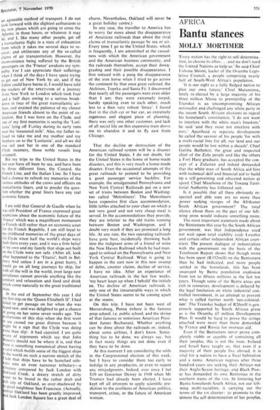AFRICA
Bantu stances
MOLLY MORTIMER
'Every nation has the right to self-determina- tion, to choose its allies ... and we don't need the United Nations to help us.' So said Chief Ushona Shiimi, leader of the Ovamba Legis- lative Council, a people comprising nearly half of South-West Africa's population.
'It is our right as a fully fledged nation to plan our own future.' Chief Matanzima„ lately re-elected by a large majority of his three million Xhosa to premiership of the Transkei is an uncompromising African nationalist and challenged any white party in the recent South African elections to repeal his homeland's constitution. 'I do not want to interfere with the white man's freedom,' he said 'and they must not interfere with ours.' Apartheid or separate development he called the saviour of his people 'for with a multi-racial free for all, our land and our people would be lost within a decade'. Chief Gatsha Buthelezi, the great and respected chief of the Zulu people and like the others a Fort Hare graduate, has accepted the con- cept of a Zulustan and indeed demanded that the white man of South Africa aid him with technical skill and financial aid to build up a self-governing and educated nation at speed. Chief Masebone of the Tswana Terri- torial Authority has followed suit.
Is it possible that all these obviously re- spected and able men are no more than power seeking stooges of the Afrikaner South African government? The total silence about them on the part of our left- wing press would indicate something more.
The most important statement made about the Bantustans this year by the South African government, was that independence need not wait upon total viability (vide Lesotho and certain other independent African coun- tries). The present dialogue of industrialists with the government on the basis of the Tomlinson Report shows that though more has been spent (R332mill) on the Bantustans than he had indicated, and more people settled in the homelands, this has been swamped by Bantu population explosion from ten to fifteen millions in the last ten years. Though some of the Bantu areas are rich in resources, development is delayed by the legal limitation on white industrial con- trolled investment, in an attempt to .prevent what is called further north 'neo-colonial- ism'. The Transkei budget of R26mill is gen- erously supported by South African grant as is the Ovamba £5 million Development Plan. It would be hard to prove the strings attached were more than those demanded by France and Russia for overseas aid.
Even if the Bantustans never prove com- pletely viable or capable of containing all their peoples, this is not the issue. Ireland and Israel have taught us, that even if a majority of their people live abroad, it is vital for a nation to have a local habitation and a name. American negroes after three hundred years are seeking their African not their Anglo-Saxon heritage, and Black Pow- er has demanded its own Bantustan in the southern states of the USA. In fostering her Bantu homelands South Africa, not our left- wing multi-racialists, is carrying out the terms of the UN charter : to promote to the utmost the self-determination of her peoples.






















































 Previous page
Previous page